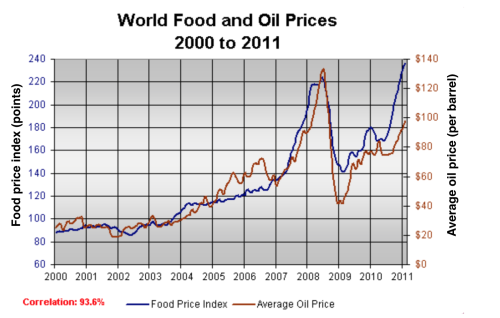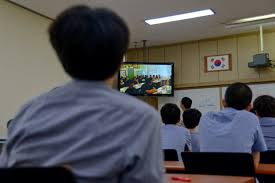[Sumit S] Writing Practice Test 565292
Task 1
You should spend about 20 minutes on this task.
The graph below shows changes in global food and oil prices between 2000 and 2011.
Summarise the information by selecting and reporting the main features and make comparisons where relevant.
You should write at least 150 words.

The graph illustrates how the indicators of world food and oil prices changed from 2000 to 2011.
Overall, food price index and average oil price showed a rising trend despite a major fluctuation after 2008.
Starting from a food price index of about 90 points in 2000, it rose gradually to reach almost 140 points in 2007. From this point, the figure for food price rocketed to the peak with approximately 220 points in the middle of 2008. The figures for avarage oil price followed the food price index so far with almost a same pinnacle.
After that, both the line graphs declined sharply to a trough in 2009 with an approximate figure of 140 and 40, respectively. Then, two lines climbed again until the end of the period despite some minor variations. Finally, food price index superseded it's previous high-point with 240 points and average oil price ended with a figure of 100 in 2011.
Task 2
You should spend about 40 minutes on this task.
Write about the following topic.
Some teachers think that international student exchange would be beneficial for all teenage school students.
Do you think its advantages will outweigh the disadvantages?
Give reasons for your answer and include any relevant examples from your own knowledge or experience.
You should write at least 250 words.

It is often argued by a number of academicians that international exchange programs would be advantageous for all school students. Altough it also has some negative sides, I think the benefits outraces them.
First of all, teenage students who are always keen to know about new things like culture, people and technologies will be benefited by the exchange programs. It will provide them ample scope of exploring those features of different nations and develop a feeling of empathy. For example, a research on college students found that who had already visited atleast one foreign country and resided with natives expressed more empathetically about them. This finding comes with a point that exchange progreams are not beneficial only for the students who get it but also for the ones who studies with them.
Secondly, students learn many skills which are available in their own country which improves their career prospects. In other words, exchange programs aid sharing of knowledge among the students from a variety of states and facilitates to acquire knowledge. For instance, a student from India will definitely improve his english language if he or she completes one of his semesters in England. So, international exchanges helps students to enrich their CV with skills and achieve their goals.
However, some people suggests that student may choose wrong things if they are sent to the exchange programs. They tries to warn that parents will not be able to lookafter them regularly and teacher will loose their grip over them which will spoil them. But a teenage school student should possess the liberty of making choices between right and wrong. In addition, he needs to be self-dependent while relying on parents and teachers may make him less confident about his ability. That's why, I don't think this feel of insecurity should take in account as the benefits already outweighs it.
To conclude, teenage school students need to expore new skills along with developing an empthetic mindset toward others. Exchange programs provide them with this opportunities depite a few occation of deviating from the track.
Community’s feedback
Sorry! We couldn't find any contents.



